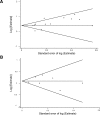Depression and type 2 diabetes over the lifespan: a meta-analysis
- PMID: 19033418
- PMCID: PMC2584200
- DOI: 10.2337/dc08-0985
Depression and type 2 diabetes over the lifespan: a meta-analysis
Abstract
Objective: It has been argued that the relationship between depression and diabetes is bi-directional, but this hypothesis has not been explicitly tested. This systematic review examines the bi-directional prospective relationships between depression and type 2 diabetes.
Research design and methods: A search was conducted using Medline for publications from 1950 through 2007. Reviewers assessed the eligibility of each report by exposure/outcome measurement and study design. Only comparative prospective studies of depression and type 2 diabetes that excluded prevalent cases of depression (for diabetes predicting depression) or diabetes (for depression predicting diabetes) were included. Two sets of pooled risk estimates were calculated using random effects: depression predicting type 2 diabetes and type 2 diabetes predicting depression.
Results: Of 42 full-text publications reviewed, 13 met eligibility for depression predicting onset of diabetes, representing 6,916 incident cases. Seven met criteria for diabetes predicting onset of depression, representing 6,414 incident cases. The pooled relative risk (RR) for incident depression associated with baseline diabetes was 1.15 (95% CI 1.02-1.30). The RR for incident diabetes associated with baseline depression was 1.60 (1.37-1.88).
Conclusions: Depression is associated with a 60% increased risk of type 2 diabetes. Type 2 diabetes is associated with only modest increased risk of depression. Future research should focus on identifying mechanisms linking these conditions.
Figures


Comment in
-
Depression and type 2 diabetes over the lifespan: a meta-analysis. Response to Mezuk et al.Diabetes Care. 2009 May;32(5):e56; author reply e57. doi: 10.2337/dc09-0027. Diabetes Care. 2009. PMID: 19407066 No abstract available.
References
-
- American Diabetes Association: Diabetes Fact Sheet. Available from http://wwwdiabetesorg/about-diabetesjsp, 2005. Accessed 1 May 2008
-
- Kessler R, Berglund P, Delmer O, Jin R, Merikangas K, Walters EE: Lifetime prevalence and age-of-onset distributions of DSM-IV disorders in the National Comorbidity Survey Replication. Arch Gen Psychiatry 62:593–602, 2005 - PubMed
-
- Strine T, Mokdad A, Dube S, Balluz L, Gonzalez O, Berry J, Manderscheid R, Kroenke K: The association of depression and anxiety with obesity and unhealthy behaviors among community-dwelling US adults. Gen Hosp Psychiatry 30:127–137, 2008 - PubMed
-
- Weber B, Schweiger U, Deuschle M, Heuser I: Major depression and impaired glucose tolerance. Exp Clin Endocrinol Diabetes 108:187–190, 2000 - PubMed
-
- Golden SH: A review of the evidence for a neuroendocrine link between stress, depression and diabetes mellitus. Curr Diabetes Rev 3:252–259, 2007 - PubMed
Publication types
MeSH terms
Grants and funding
LinkOut - more resources
Full Text Sources
Other Literature Sources
Medical
Miscellaneous

